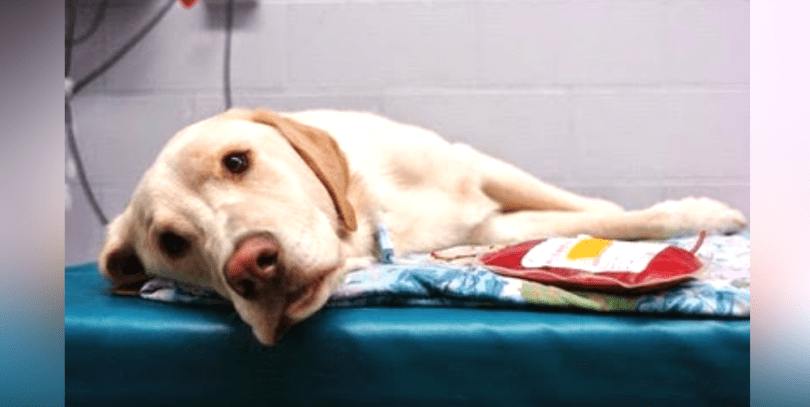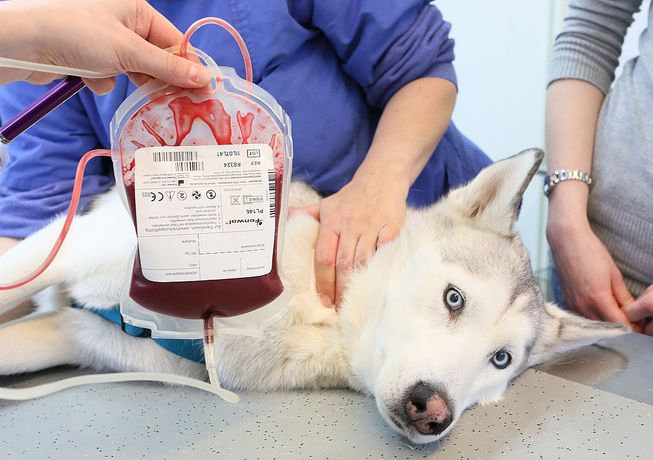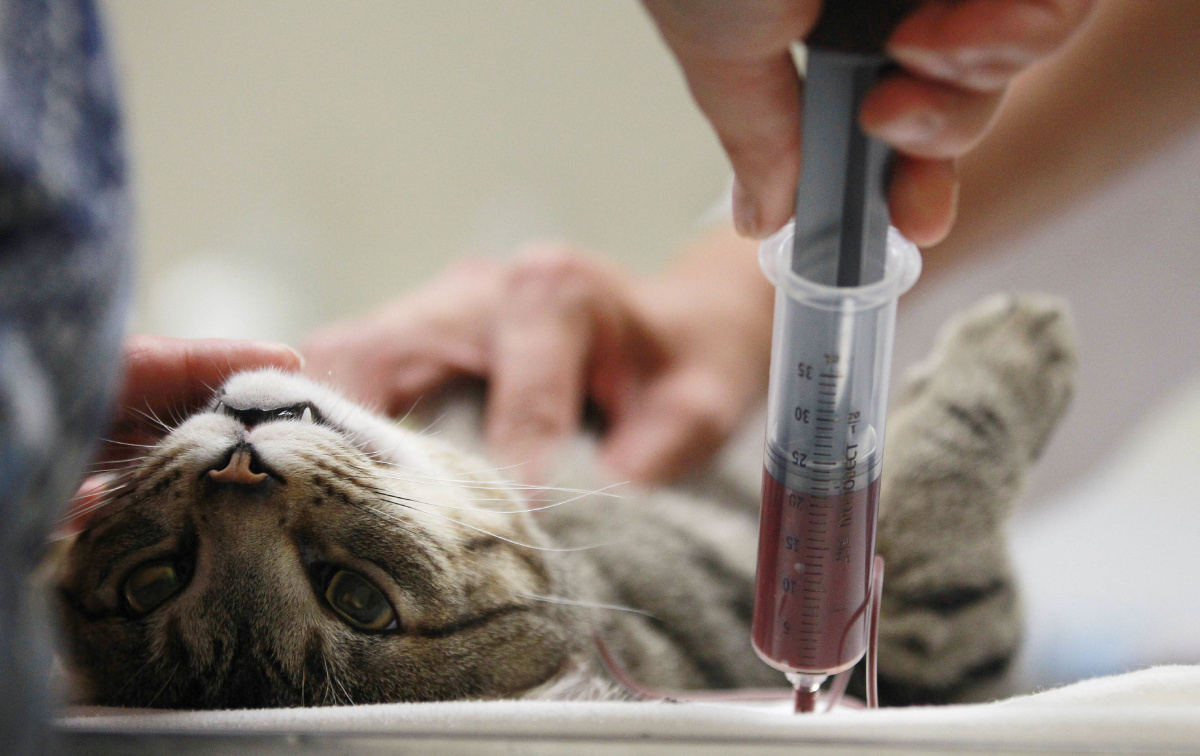Dog giving blood to another dog is as common as a human giving blood to another human. Unlike human blood, the shelf life of a dog’s blood is only 30 -35 days. It means that dogs would need to donate frequently to keep the blood bank functioning.
There are fewer blood banks for dogs around the country, whereas the canine accidents are way more common. When dogs (and cats!) have an injury, become ill, or need surgery, a blood transfusion could save their lives. Thanks to the generous blood donors, many of those pets have survived the worst.
Can a dog become a canine blood donor?
Dogs most certainly can become a blood donor for other dogs. In almost every case of blood transfusion, the blood is donated by another dog. In a few cases, the blood of feline (cat) is also used.

The dog’s blood type is distinguished by the antigens and antibodies. This can be classified into four categories.
DEA 1.1, 1.2, and 1.3, also known as A-type
DEA 1 was formerly known as A and consists of four alleles: negative, 1.1, 1.2, and 1.3. DEA 1.1. It is the most common blood type for most dogs. DEA 1.1 and DEA 1.2 are the most important antigens and together occur in about 60% of dogs, however, DEA 1.2 dogs, which make up 7% to 29% of dogs, will develop potent anti-DEA 1.1 antibodies once transfused with DEA 1.1 cells.
Dogs that are DEA 1.1 positive or A-Type are considered universal recipients. They can receive the blood of any type without expectation of a life-threatening hemolytic transfusion reaction.
Dogs that are DEA 1.1 negative are considered universal donors. They can donate blood to any other dog.
DEA 4
DEA 4 occurs in up to 98% of dogs, and dogs with this type alone are considered universal donors. Only about 75% of Doberman pinschers are DEA 4 positive. Naturally occurring DEA 4 antibodies are not known to exist; however, hemolytic transfusion reactions can occur after sensitization with DEA 4 positive blood transfusions in dogs lacking that antigen.4
DEA 3 and 5
DEA 3 and 5 are expressed in lesser proportions of the dog population, but DEA 3 occurs in 23% of greyhounds, and 30% of greyhounds are DEA 5 positive. Naturally occurring antibody is present in 20% of DEA 3 negative dogs and 10% of DEA 5 negative dogs in the United States.2
DEA 7
DEA 7 is present in 8% to 45% of dogs. Naturally occurring antibodies have been observed against DEA 7, with a delayed transfusion reaction causing the decreased lifespan of transfused cells but no hemolysis.
A single canine blood donation can be used to save up to 4 dogs’ lives!
Can Any Dog Give Blood?
The veterinarian society has specified certain requirements for canine blood donation.
- A dog must be healthy, weighing 35 pounds or more, and must be between the ages of 9 months and about 9 years old
- The dog must have been spayed or neutered, with no history of pregnancy in the case of female dogs
- Must have no history of the disease and not taking any medications
- Must be taking a heartworm preventive
- Must have followed with veterinarian’s preventive health and vaccination schedule.
- Must be well-behaved and friendly to avoid the need for sedation.
Blood Donation Process
The blood donation process includes relaxing the dog, taking out blood, replenishing the donor, and preserving the donated blood.
A typical donation takes about 10 to 30 minutes. The donor is placed on a table and relaxed. A small patch of fur on the dog’s neck is shaved, and a tiny needle is inserted to collect the blood.
As soon as the blood is drawn, the dog’s body begins to produce more to replace it. The donors are replenished by offering water and snacks immediately after donation. While some dogs may be sluggish or weak after donating, others have no reaction at all.

How big does a dog have to be to donate blood?
Only a fully grown canine is used for blood donation. There are many requirements that a dog must pass before begin assigned a donor.
Every blood donation program has slightly different requirements for its donors, taking into account the health and size of the animal.
According to the National Canine Cancer Foundation, there are two types of blood donation programs:
While dogs of various sizes and breeds can meet donor requirements, their weight determines which donation program they will be placed into once they meet the basic behavioral and health criteria.
The potential donor dogs must be in generally good health. The veterinarian will then ascertain if donors meet their required vaccinations, including distemper, parvovirus, parainfluenza, hepatitis, and rabies.
They must be free of any medications other than flea, tick, and heartworm preventative.
Dogs who have received blood transfusions or those with heart murmurs or other cardiac issues aren’t ineligible to donate blood.
The dogs must be spayed or neutered, with no history of pregnancy for female dogs.
Age and weight requirements vary slightly from across programs, typically ranging from one to nine years of age and thirty-five to fifty pounds or more without being overweight.
Adult Greyhound dogs represent the bulk of the blood donors in the U.S. They typically have a universal blood type that any dog can receive. They also have big neck veins that make drawing blood easy.

Where do vets get blood for dogs?
The vets get blood for dogs from other dogs. Most of the time, they use the nearest blood center to get the Blood for transfusion. Other times, a dog is brought in for direct transfusion.
In many instances, blood is collected from a donor at the time it is needed from an animal that is nearby.
Dog blood is available from blood banks that centralize the collection of blood from pet dogs through larger facilities which are then able to separate blood into different components and prepare it for storage. Be wary that the shelf life of a dog’s blood is only 30-35 days.
Wherever possible, cats and dogs should receive blood from a donor of the same species and blood type. In some cases, a different animal such as a cat can give blood to the dog.
Urban Pet Hospital & Resort is the best veterinary in Des Moines specializing in pet care, pet health, and training. Get in touch with Veterinary in Des Moines to learn more about safe blood transfusion in dogs and cats.